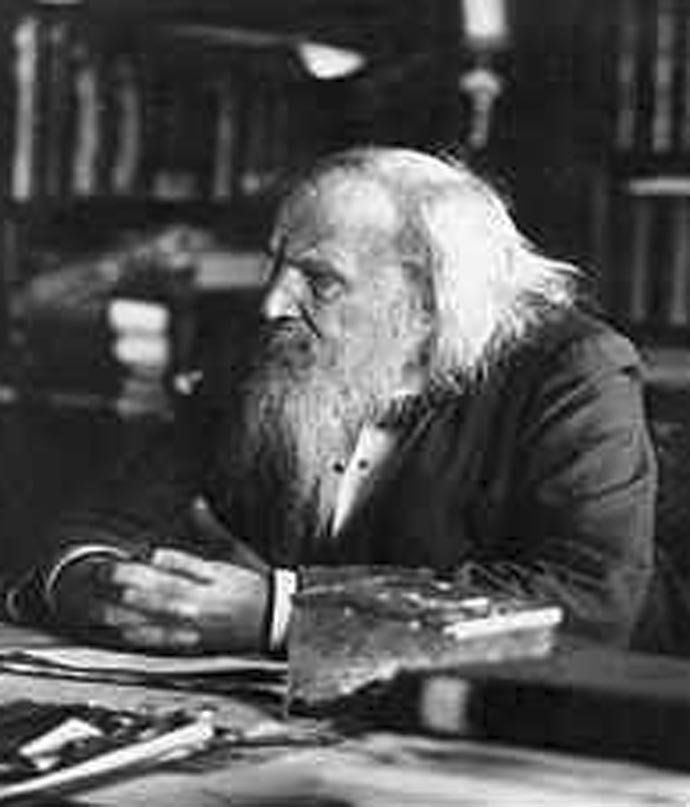Dmitri Mendeleev revolutionized our understanding of the properties of atoms and created a table that probably embellishes every chemistry classroom in the world.
Dmitri Mendeleev was born at Tobolsk, Siberia, in 1834. He studied science at St. Petersburg and graduated in 1856. In 1863, Mendeleev was appointed to a professorship and in succeeded to the Chair in the University. The Russian chemist and science historian L.A. Tchugayev has characterized him as “a chemist of genius, first-class physicist, a fruitful researcher in the fields of hydrodynamics, meteorology, geology, certain branches of chemical technology and other disciplines adjacent to chemistry and physics, a thorough expert of chemical industry and industry in general, and an original thinker in the field of economy.

His greatest accomplishment, however, was the stating of the Periodic Law and the development of the Periodic Table. From early in his career, he felt that there was some type of order to the elements, and he spent more than thirteen years of his life collecting data and assembling the concept, initially with the idea of resolving some of the disorder in the field for his students.
Legacy
Mendeleev was one of the first modern-day scientists in that he did not depend completely on his own work but rather was in correspondence with scientists around the world in order to receive data that they had collected. He then used their data along with his own data to arrange the elements according to their properties. He is credited as being the creator of the first version of the periodic table of elements for which in , The Nobel Committee for Chemistry recommended to the Swedish Academy to award the Nobel Prize in Chemistry to Mendeleev for his discovery of the periodic system.
Besides his work on general chemical concepts as discussed earlier, Mendeleev spent much of his time working to improve technological advances of Russia. Many of his research findings dealt with agricultural chemistry, oil refining and mineral recovery. Dmitri was also one of the founding members of the Russian Chemical Society and helped open the lines of communication between scientists in Europe and the United States.
Mendeleev also pursued studies on the properties and behaviour of gases at high and low pressures, which led to his development of a very accurate differential barometer and further studies in meteorology. He also became interested in balloons, which led to a rather dangerous adventure as he made a solo rise, without any prior experience, whereas his family was rather concerned too but ultimately he completed his observations and found a way of transport through his efficient working.
In another department of physical chemistry, he investigated the expansion of liquids with heat, and devised a formula similar to Gay-Lussac’s law of the uniformity of the expansion of gases, while as far back as 1861 he anticipated Thomas Andrews’ conception of the critical temperature of gases by defining the absolute boiling-point of a substance as the temperature at which cohesion and heat of vapourization become equal to zero and the liquid changes to vapour, irrespective of the pressure and volume. Mendeleev is also given credit for the introduction of the metric system to the Russian Empire. He invented pyrocollodion, a kind of smokeless powder based on nitrocellulose.
This work had been commissioned by the Russian Navy, which however did not adopt its use. Once in an attempt at a chemical conception of the Aether, he put forward a hypothesis that there existed two inert chemical elements of lesser atomic weight than hydrogen. Of these two proposed elements, he thought the lighter to be an all-penetrating, all-pervasive gas, and the slightly heavier one to be a proposed element, coronium. Mendeleev devoted much study and made important contributions to the determination of the nature of such indefinite compounds as solutions.
Talking about Mendeleev’s publications, from his first book entitled “Chemical Analysis of a Sample from Finland” to his final work, “A Project for a School for Teachers” and “Toward Knowledge of Russia”, Mendeleev’s records enlightening his research findings and beliefs reach the number over 250. His most famous publications include Organic Chemistry, which was published when he was 27 years old. This book won the Domidov Prize and put Mendeleev on the forefront of Russian chemical education.
Throughout the remainder of his life, Dmitri Mendeleev received numerous awards from various organizations including the Davy Medal from the Royal Society of England, the Copley Medal, the Society’s highest award, and honourary degrees from universities around the world and continued to be a popular social figure until his death at the age of seventy two in Petersburg.

